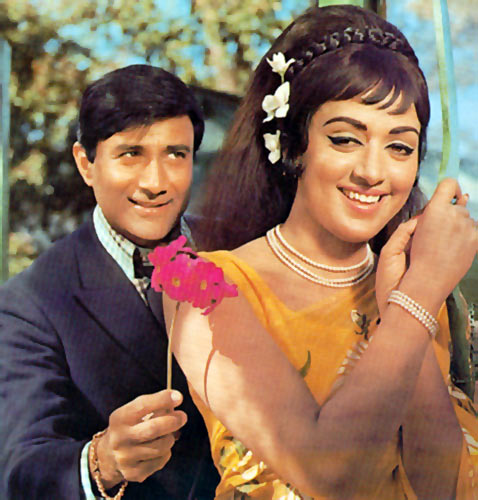
In this series, we re-visit great Hindi film classics. Today, we look back at Dev Anand-Hema Malini's Johny Mera Naam (1970).
Going through the best of Vijay Anand offers unfailing gratification.
His filmmaking is a wealth of style, storytelling and treatment that seldom limits itself to the boundaries of commercial cinema but breaks, bends and reconstructs it in ways no one deemed possible.
More importantly, there's so much poise in his ingenuity, even the improbable seems like an exhilarating idea.
Johny Mera Naam reinforces this analysis better than any of his films.
A ritzy potpourri of revenge, lost and found, undercover operations, infiltration in enemy camps, concealed motives and sly game of wits, the 1970 blockbuster packs in quite a loaded action drama with Dev Anand, Hema Malini, Pran, Premnath, Iftekhar, Jeevan, Padma Khanna and I S Johar in key roles.
Shot predominantly in Kathmandu, Nepal (a nation Devsaab would further explore to film his directorial ventures Hare Rama Hare Krishna and Ishq Ishq Ishq) and a memorable song sequence in the Nalanda ruins (Bihar), a great deal transpires in Johny Mera Naam. But it's in its seemingly miniscule details that the film catapults itself in another league.
Right from its terrific opening credits -- boosted by Kalyanji-Anandji's groovy background score -- Johny Mera Naam promises to be something special. Considering how keenly this all-rounder went on to influence later-day entertainers, it sure has kept its part of the deal.
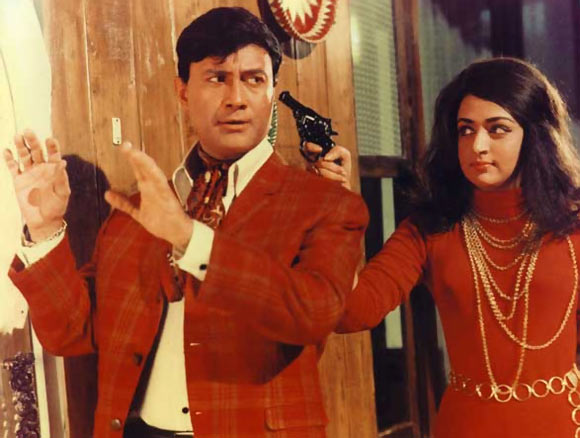
Johny Mera Naam opens with a scene in the boxing ring -- two young brothers, presumably in their early teens, socking each other's jawbones and eyeballs in an ongoing contest, which concludes with the referee declaring both triumphant.
Next, the camera zooms to their relieved mother, pleased father and well-meaning family friend -- both men clad in khaki uniforms -- they're police officers.
Cut to the first major kahani mein twist -- the boys' father is stabbed to death by a paid thug -- leading to one of the brothers chasing him and accidentally stabbing him with the same knife.
The terrified boy hides himself in the boot of an unknown car, which coincidentally, belongs to his father's original killer and notorious smuggler -- Ranjit Singh (played by Premnath). Oblivious to this, he grows up to become his right-hand man (Pran) while his younger sibling (Dev Anand) follows the footsteps of his policeman father.
But this is Vijay Anand and he doesn't believe in dragging the screenplay to emphasise on the magnitude of this double calamity. He means business and gets to the point without further ado but ever so foxily. So instead of sobbing mothers griping about 'mere laal tu kahan kho gaya' and 'maa ki mamta,' we meet Jeevan, a shady diamond dealer from Hong Kong.
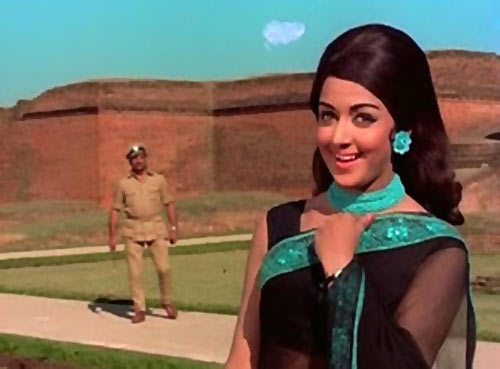
One of the most feebly utilised character actors, Jeevan proves his range beyond the stumbling, hamming fool with restrained shrewdness here. It's equally great to witness Iftekhar in a rare, refreshingly loosened-up avatar.
There's a nice moment between the two where the latter interrogates him with one half of a photograph asking him if he's seen the fellow in the picture anywhere and Jeevan flatly denies only for the cop to unfold the other side revealing him in the photograph. The same scene takes place between Dilip Kumar and Amrish Puri in Ramesh Sippy's Shakti.
Jeevan's Heera is crisply written, especially noteworthy are the events that lead him behind bars -- how the cops track him at the sports club, the curious case of his racket, his subtle signals -- a nod, a whisper, a look and eventually his arrest over drinking alcohol without permit. The last sequence also works as a hilarious excuse for I S Johar, playing a triple role (for which he was awarded Best Comedian Filmfare trophy), to demonstrate his fizzy humour.
In jail, Jeevan meets Dev Anand, THE star and Johny Mera Naam's swashbuckling titular hero, in a role designed to spotlight his larger-than-life flamboyance. And he happily obliges.
Clad in a hip wardrobe (in tan, pink, ochre and carroty hues) of trendy jackets, printed shirts and vibrant silk scarves, the legend lives up to his fashion icon reputation. To think he's in his late 40s romancing a 22-year old Hema Malini (looking chic in Bhanu Athaiya designed ravishing outfits).
Despite the age difference, the duo makes a beautiful pair and their bittersweet banter provides a delightful distraction from the conspiracy-rich plot. Though the pair went on to star in as many movies afterwards -- Tere Mere Sapne, Chhupa Rustam, Shareef Badmaash, Joshila and Janeman, none matched the chemistry of the first one.
Dev Anand's Johny of the 'Mera asli naam Johny. Naqli bhi Johny' fame makes a deal with Jeevan over the diamonds, leading him to Rekha (Hema Malini), an accomplice of Moti (a reliably solid Pran) with the prime objective of breaking into Ranjit Singh's gang, which operates from Kathmandu.
Only no one is who they really seem. In discovering the motives through masterful twists, which entertain the gift for impromptu yarns, lies the real joy and beauty of Vijay Anand's hugely successful offering.
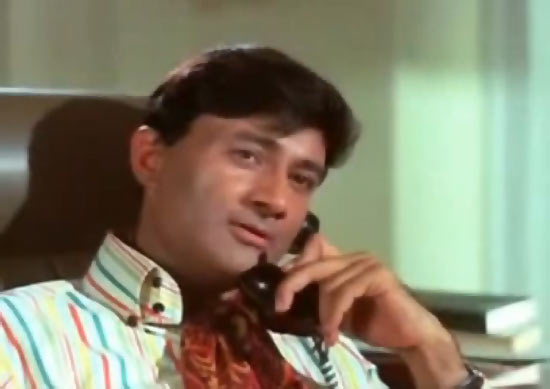
While its emotionality comes into play only during the end stages, Johny Mera Naam, for most part, is committed to engage with its irresistible depiction of both -- the lawbreakers as well as the ones who protect it.
And so smuggled goods or drugs are transferred in cartons underneath a layer of fragile glasses or musical instruments, fake jewels are readied to replace authentic ones, dealing parties get access over verbal codes like Ek Aur Ek Gyarah and exchange of suitcases happens in the blink of a eye -- the kind you notice only because of Fali Mistry's alert (and deft) camerawork.
The kind of gadgetry Iftekhar equips Dev Anand's undercover cop with -- a lighter that can secretly takes pictures (while cautioning him Fizool mat zaaya karo, film barbaad hoti hai) and a transistor that can read conversations with the aid of hidden microphones -- is reminiscent of a certain agent who goes by the roll call of 007.
So is a neat drilling session, wherein a tied-up Johny transforms into a tied-up comic flawlessly fibbing and flirting to impress and win Moti and Rekha's trust. Unaware of their blood ties, they casually address each other as brothers. There's a wink of a reference to the director's previous success Teesri Manzil too when Devsaab says, 'Yakeen nahi aata toh Bambai ke Kalbadevi road par Kamla Mahal ke Teesri Manzil par kisi ko bhejiye, mera baap ab bhi wahin rehta hai.'
In any other movie, the sitars would set off but there's place for hokey face-offs in Vijay Anand's vision. Boxing bonded them. Boxing brings them back together. In a spectacularly staged moment, it's not some piece of photographic evidence or weepy mom or concealed body scars, but simply the other's hitting style that leads to realisation and reunion.
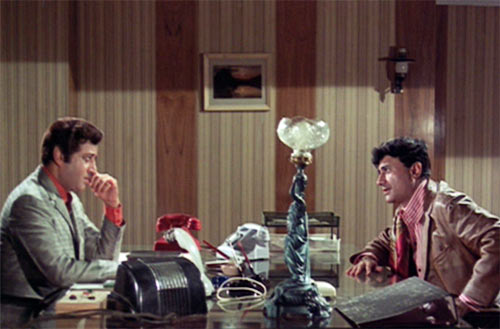
What's also notable is how songs aren't mere fillers to highlight Hema Malini's gorgeous, glamorous being or Devsaab's competence to woo but often work as opportunities to forward the narrative. In O Mere Raja, the pair evades a bunch of prying police eyes by pretending to be up, close and personal.
Our imaginative director films it against the stunning backdrop of Nalanda, ruins, temples, cable car et al, to lend even more razzle to the dazzle. In Mose Mora Shyam Rootha, a luminous Malini expresses her moral dilemma in robbing/replacing jewels off temple deities while an intimidating Pran looks on. They're both in get-ups, something the protagonists of Johny Mera Naam indulge in a lot to draw out the game of deceit.
Even the seductive striptease by Padma Khanna, where the dancer moves evocatively in bare minimum clothing to attract a disturbingly turned on Premnath's lust, Husn Ke Lakhon Rang (in Asha Bhosle's no hold barred sensual voice) and save her boyfriend (Randhawa, Dara Singh's younger brother) is inarguably risque for its time. Besides strengthening Khanna's bold image, the malevolent onscreen deeds of Premnath brought his efficiency at villainy in forefront.
Needless to say, Johny Mera Naam's soundtrack by Kalyanji-Anandji has turned out to be as enduring as the movie, in particular Kishore Kumar's peppy rendition of Pal Bhar Ke Liye and Nafrat Karne Walon Ke.
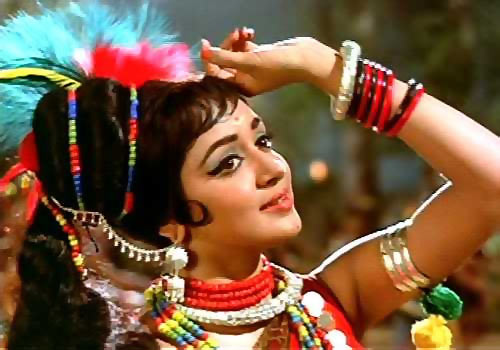
Given the number of complications that develop during the course of Johny Mera Naam, the climax is expectedly lengthy but always engrossing. The histrionics are subdued and sly with everyone either engaged in outsmarting another, discovering a lost one but ultimately trying to come out on top.
In this fascinating feature, screenwriter, actor and director Saurabh Shukla breaks the climax down in detail and points out its merits with the objectivity of a filmmaker.
The culmination of Johny Mera Naam finds another admirer in choreographer turned director Farah Khan as well. In an interview to rediff.com, she dubs it one of her favourite scenes of all times while adding, 'If I ever wanted to remake a movie, I'd try to do this one, just for the climax.'
Anyone who follows director Sriram Raghvan's love for the movies closely will know just how much he adores the film; he even paid it a tribute by calling one of his most acclaimed capers, Johnny Gaddar. He too agrees (https://www.rediff.com/movies/2007/sep/27slde7.htm) on it being, 'one of the most terrific and well-written climax scenes ever.'
Johny Mera Naam happens to be Dev Anand's son, Suniel's favourite film of his father's, 'It was a fantastic film. I think he looked dashing, the music was good. I loved it, for me it was a benchmark.'
Need I say more?